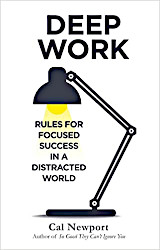“Deep Work” by Cal Newport is the kind of book that is important for people whose work requires them to achieve long hours of uninterrupted focus in order to get ahead in their field. For example, when you achieve flow in your work, you feel very productive and can derive greater satisfaction from it. Unfortunately the modern world seems to be set up in a way that is designed to prevent you from achieving flow and thus personal growth.
The author defines deep work as the kind of professional activities that are performed with a distraction-free concentration and that push your cognitive capabilities to their limit. This is in opposition to shallow work that is not cognitively demanding, logistical in nature, and often performed in a state of distraction. The author argues that the ability to perform deep work is increasingly becoming rare at exactly the same time as it is increasingly becoming valuable in our economy. As a software engineer cursed to work in open-plan offices, I strongly concur.
The author presents a few rules to help you consistently achieve deep work. I was pleasantly surprised to find a lot of my own tactics listed here. For example, I have been carving out “focus time” chunks on my calendar and have been trying to “defrag” my meetings as much as possible so that I have at least some hope of getting around to doing the important things in my job. (This is referred to as the “rhythmic” depth philosophy in the book.) That said, I break the second rule in the book by being constantly distracted via my smartphone (chiefly through Hacker News and Twitter).
In fact, one of the harder rules to follow in this book is about social media and the Internet. The author asks us to apply the law of the vital few to our Internet-habits – adopt a network tool (social media app, web-site, etc.) only if its positive impact on core factors substantially outweigh its negative impacts. This is in sharp contrast to the “any benefit” threshold of using a network tool that most of us employ. We tend to use such network tools if there is any benefit to using them (e.g. connecting with our friends from school, keeping up with the careers of our professional colleagues, etc.). Note that this is not about completely quitting all social media and web-sites, but about being extremely intentional in which network tool you use and how you use it.
Three of the four rules in this book are essentially variations on being less connected and being more intentional with your time. The author repeatedly insists that deep, meaningful work that advances you professionally is quite possible to achieve, while having a healthy work-life balance. The key is to drain out the shallows (the mindless distractions that we engage in throughout the day and at any hint of boredom) and carving out time for focussed work.
As I have noted above, I have already been trying to adopt some of these habits with some success, even before having read this book. Most folks in my profession already recognize the value and the rarity of deep work. This makes me think that the advice in this book is reasonably plausible and therefore good. I shall certainly be revisiting this book time and again and hope to benefit more from the advice herein. Highly recommended.
